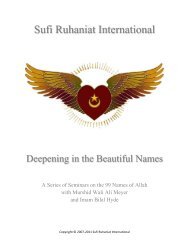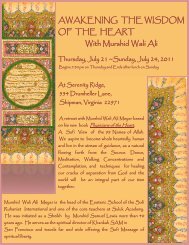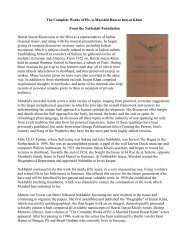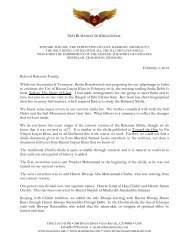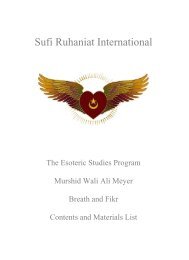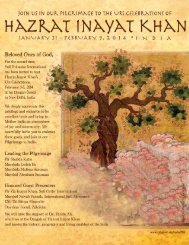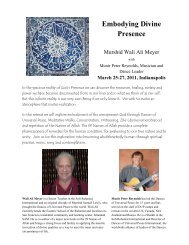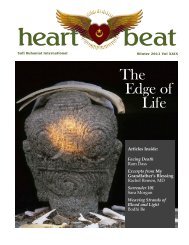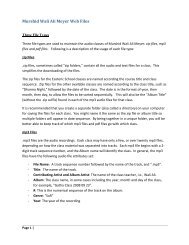HeartBeat Summer 2009 - Sufi Ruhaniat International
HeartBeat Summer 2009 - Sufi Ruhaniat International
HeartBeat Summer 2009 - Sufi Ruhaniat International
Create successful ePaper yourself
Turn your PDF publications into a flip-book with our unique Google optimized e-Paper software.
Editor’s note: The following chapter is reprintedfrom The Tent of Abraham: Stories of Hope andPeace for Jews, Christians and Muslims by Joan Chittister,OSB; Murshid Saadi Shakur Chishti, andRabbi Arthur Waskow (Beacon Press, 2006). Inthe book the authors retell andoffer contemporary commentaryon the stories of Abraham, Sarahand Hagar from the standpoint ofthe three traditions. Translationsfrom the Qur’an are by the authorunless otherwise noted.We identified for Abraham thesite of the House and told him:“Do not associate any thing,thought or idea with the OneReality when you pray; andsanctify my House for thosewho circumambulate it orstand up or bow or prostratethemselves there.—Sura 22:26.Where Adam and Eve Made LoveThe climax of the story of Abraham in Meccacomes with his third visit when, according to Islamictradition, he and Ishmael build the Kaaba.This time when Abraham arrives, Ishmael is hometrimming arrows, preparing to go hunting again.Abraham tells him of God’s command to build theKaaba and Ishmael offers to help.A divine messenger in the form of a cloud orwind shows them the site. As they dig, they findthe foundations of an older shrine, built by Adam.Here pre-Islamic and non-orthodox Biblical traditionsknit themselves together with the story relatedby the Qur’an and in the hadith. In the largerIslamic story, as told by various commentators, 11For instance, in the 11 th century traditional collectionTales of the Prophets by Muhammad ibn Abd Allah al-Kisai, translated by W. M. Thackston, Jr (1997).by Saadi Shakur Chishti (Saadi Douglas-Klotz)Saadi Douglas-KlotzAdam and Eve were expelled from Paradise whenthey were tempted to ignore God’s command notto eat grain from the “Plant of Eternity” (a changefrom the Biblical Tree of the Knowledge of Goodand Evil). They are tempted by Iblis (a rebelliousangel), who said that eating thegrain will make them eternal.This telling of the story seemsto reflect an early suspicion ofagriculture as providing a falsesense of security. A nomad traditionallydepended upon graceof the divine realm for survival.After Adam and Eve leaveParadise, they are separated forhundreds of years, each mourningtheir joint mistake as well astheir separation from each other.According to one story, Adamlands in India and his tears turnto musk, while Eve lands on thecoast of Arabia and her tears turnto pearls and coral. The windcarries their voices to each other,which causes them even moresorrow and longing. Finally, when they have repentedenough, God reunites them in Mecca. Firstthey circumambulate and then make love insidethe original Kaaba.These older, evocative stories become part ofIslamic tradition when the Qur’an describes Abrahamand Ishmael rebuilding the Kaaba. Accordingto this story, the famous Black Stone in a cornerof the Kaaba was first a brilliant white, broughtby Adam from paradise. The angel Gabriel carriesit to Abraham from India, but in subsequentgenerations it turns black during disputes overwho owns the shrine.As Abraham and Ishmael build the Kaabathey pray:»<strong>Sufi</strong> <strong>Ruhaniat</strong> <strong>International</strong> 9



